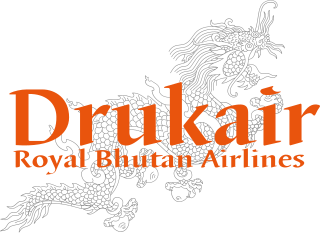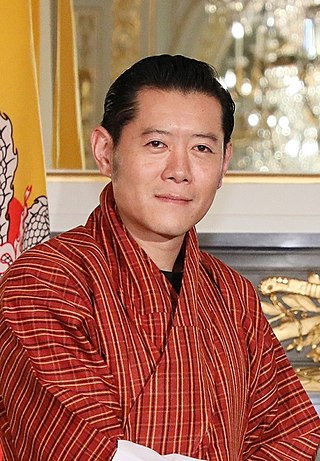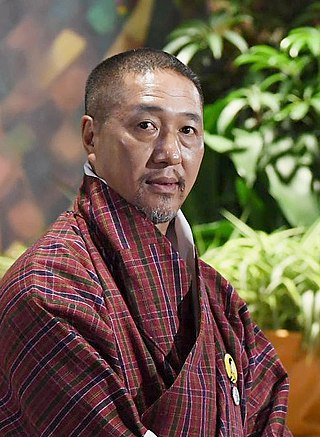Related Research Articles

Thimphu is the capital and largest city of Bhutan. It is situated in the western central part of Bhutan, and the surrounding valley is one of Bhutan's dzongkhags, the Thimphu District. The ancient capital city of Punakha was replaced by Thimphu as capital in 1955, and in 1961 Thimphu was declared as the capital of the Kingdom of Bhutan by the 3rd Druk Gyalpo Jigme Dorji Wangchuck.
Transport in Bhutan uses about 8,000 kilometres (5,000 mi) of roads and four airports, three of which are operational and interconnected. Paro Airport is the only airport which accommodates international flights. As part of Bhutan's infrastructure modernization programs, its road system has been under development since the 1960s. There are no railways, and as Bhutan is a landlocked country with no major waterways, there are no ports.

The Royal Bhutan Army is a branch of the armed forces of the Kingdom of Bhutan responsible for maintaining the country's territorial integrity and sovereignty against security threats. The Druk Gyalpo is the Supreme Commander in Chief of the RBA. The Chief Operations Officer is Goonglon Gongma Batoo Tshering.

Drukair Corporation Limited, operating as Drukair — Royal Bhutan Airlines, is the flag carrier of the Kingdom of Bhutan, headquartered in the western dzongkhag of Paro.

Bhutan, officially the Kingdom of Bhutan, is a landlocked country in South Asia situated in the Eastern Himalayas between China in the north and India in the south, with the Indian state of Sikkim separating it from neighbouring Nepal. With a population of over 727,145 and a territory of 38,394 square kilometres (14,824 sq mi), Bhutan ranks 133rd in land area and 160th in population. Bhutan is a constitutional monarchy with a Druk Gyalpo (king) as the head of state and a prime minister as the head of government. The Je Khenpo is the head of the state religion, Vajrayana Buddhism.

Jigme Khesar Namgyel Wangchuck is the King of Bhutan. His reign began in 2006 after his father Jigme Singye Wangchuck abdicated the throne. A public coronation ceremony was held on 6 November 2008, a year that marked 100 years of monarchy in Bhutan.

The Bhutan Observer was Bhutan's first private bilingual newspaper. It was launched as a private limited company by parent company Bhutan Media Services (BMS), and began publishing on June 2, 2006, in Thimphu. Its Dzongkha edition was called Druk Nelug, and the newspaper maintained an online service in English until 2013.
Gelephu, also spelled as Gelyephug, Gelegphu, Gaylegphug, or Gaylephug, is a town or Thromde in Sarpang District in Bhutan. It is located on the Indian border, about 30 km to the east of Sarpang, the Dzongkhag (District) headquarters, and has a population of 9,858 as per the 2017 census. It is one of the border market and road entry points into Bhutan from India; Phuntsholing to its west and Samdrup Jongkhar to its east are two other border market road entry points into Bhutan.

Tourism in Bhutan began in 1974, when the Government of Bhutan, in an effort to raise revenue and to promote Bhutanese unique culture and traditions to the outside world, opened its isolated country to foreigners. In 1974 a total of 287 tourists visited the Kingdom of Bhutan. The number of tourists visiting Bhutan increased to 2,850 in 1992, and rose dramatically to 7,158 in 1999. By the late 1980s tourism contributed over US$2 million in annual revenue.

The visa policy of the Kingdom of Bhutan is strictly regulated under the policy of "High Value, Low Volume" tourism, in order to minimize the effect on the country's unique society and environment. Bhutanese policy ensures that only an acceptable number of tourists enter the country at a time, preventing the country from being overwhelmed by mass tourism and consequently changing its character, and that tourists who do arrive get the best experience and value from their visit.
Bathpalathang Airport is a domestic Bhutanese airport in Jakar (Bjakar), Bumthang District. One of only four airports in the country, it opened on 17 December 2011 with flights to Paro. The airport suspended operations in July 2012 due to runway damage, but it has since reopened to limited service.
Gelephu Airport is located in Samtenling Gewog, about three kilometres (1.9 mi) from Gelephu in Sarpang District, Bhutan. The airport has been constructed on an area spanning over 500 acres (200 ha) and came into regular use in late 2017. It is one of only four airports in Bhutan.
Renewable energy in Bhutan is the use of renewable energy for electricity generation in Bhutan. The renewable energy sources include hydropower.
Lam Dorji was the Chief Operations Officer (COO) of the Royal Bhutan Army (RBA) from 1964 to 2005. He was succeeded by Batoo Tshering on 1 November 2005.
A special administrative region, special region, or special administrative area is a designation for types of administrative division in China, East Timor, North Korea, Indonesia and South Sudan.

Dasho Tshering Wangchuk is a Bhutanese jurist who served as the Chief Justice of the Supreme Court of Bhutan from 2014 to 2019. In 2018, Wanghuck served as the interim Head of Government of Bhutan, when serving as the Chief Advisor of the Interim Government, following the dissolution of the Bhutanese National Assembly in preparation of elections.

Dasho Dr. Lotay Tshering is a Bhutanese politician and surgeon who was the prime minister of Bhutan, in office from 7 November 2018 to 1 November 2023. He was the president of Druk Nyamrup Tshogpa (DNT) since 14 May 2018 until he resigned in 2025.
Wangchuk Namgyel is a Bhutanese educationist and politician who was the speaker of the National Assembly of Bhutan from November 2018 to January 2024. He has been a member of the National Assembly of Bhutan from October 2018 till January 2024.
Austria maintains a formal relation with the Kingdom of Bhutan with a non-resident embassy housed in New Delhi. Bhutan is represented in Austria by its permanent mission to the United Nations in Geneva. Bhutan also has two honorary consuls within Austria, one in Vienna and the other one in Tirol and Vorarlberg.
Dasho Pema Chewang is a Bhutanese civil servant and politician who is the leader and founder of the Bhutan Tendrel Party. He previously worked as the Secretary of the National Land Commission of Bhutan from 2014 until his entry into politics in 2022.
References
- 1 2 "Bhutan King announces mega Gelephu city project along Indo-Bhutan border". India Today NE. 2023-12-17. Retrieved 2023-12-17.
- ↑ "His Majesty announces Gelephu Mindfulness City SAR project of 1,000 sq km". The Bhutanese. Retrieved 2023-12-18.
- ↑ Chaudhury, Dipanjan Roy (2023-12-18). "Bhutan King unveils plans for economic linkages with Assam". The Economic Times. ISSN 0013-0389 . Retrieved 2023-12-18.
- ↑ "Gelephu Mindfulness City to focus on seven core economic clusters to drive growth". Kuensel Online. 2024-09-09. Retrieved 2024-11-19.
- ↑ "Bhutan's Bold Vision: Gelephu Mindfulness City Sets a Global Benchmark for Sustainable Urban Development". Global Law Lists.org. 2024-09-09. Retrieved 2024-11-19.
- ↑ "GMC heralds a new chapter in Bhutan's constitutional journey". Kuensel Online. 2024-09-09. Retrieved 2024-11-19.
- ↑ Newspaper, Bhutan's Daily. "GMC to adopt Singaporean law". Kuensel Online. Retrieved 2025-01-04.
- ↑ Newspaper, Bhutan's Daily. "GMC adopts 18 Singaporean laws and 10 Abu Dhabi financial regulations". Kuensel Online. Retrieved 2025-01-04.